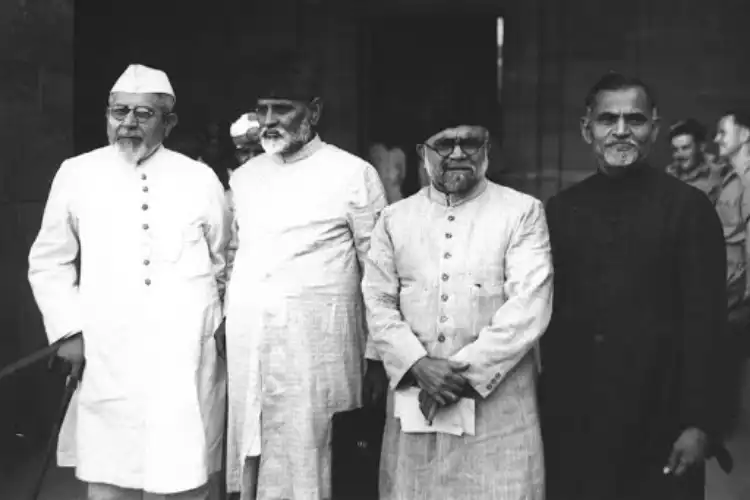A M Khwaja, Maulvi Zaheeruddin, Maulvi Hisamuddin and Hafiz Muhammad Ibrahim.
Saquib Salim
Recently during a seminar at IGNCA, Prof. Makkhan Lal, Senior Fellow at Nehru Memorial Museum & Library, drew an analogy between an amnestic person and a society that has forgotten its history. Thanks to historians who have continued the tradition of colonial historiography, Indian society is suffering from public amnesia, where they have no idea of their ‘actual’ past. Official and popular historiography keeps on feeding the sectarian feelings originally invented by the British colonists.
In the 1940s, the British-controlled or sympathetic press would not report Muslims opposing Mohammad Ali Jinnah and Muslim League. To create a popular perception that the Muslim League was the sole representative of the Indian Muslims. They were justified because they wanted to keep Indians divided to rule over them, but what on earth does explain the continuity of this narrative by the historians in Independent India?
In 1940, only a month after League declared the creation of Pakistan as its goal, almost two dozen Muslim political parties came together under the banner of the Azad Muslim Conference. Allah Bux Soomro, Premier of Sindh, headed the conference, a ‘crime’ for which he was assassinated in 1943. After his death, it was thought necessary that instead of having a coalition of several parties, all should merge to form a single political party to oppose Jinnah’s Muslim League.
After the assassination of Soomro, Dr. Shaukatullah Shah Ansari took up the leadership of the Azad Muslim Conference. The meeting was convened in the first week of May 1944. A. K Fazlul Haq, ex-premier of Bengal, on the occasion wrote to Ansari “stressing the need for setting up a ‘rival organisation’ to the Muslim League designed ‘to draw all the Muslims into it. He wrote that the Muslims should be brought under one banner to fight Muslim League.
The suggestion led to the formation of All India Muslim Majlis, a political party, with its headquarters at Drayaganj, Delhi, and A. M Khwaja as its president. Khwaja was a distinguished freedom fighter, who had campaigned against the separate electorates. The aim was to challenge the claim of the Muslim League being the only representative body of Indian Muslims.
The party its formation demanded that British free India during the World War and clear the way for the formation of a National government. It set its objectives to ensure that India remained a united country and that the constitution of India should be framed by a democratically elected Indian body.
The working committee appointed was: President - A. M. Khwaja, Allahabad, General Secretary - Dr. Shaukatullah Ansari, Delhi, Secretary - K.B Muhammad Jan, Kolkata, Treasurer - Halim Jung, Delhi, and Members - Hafiz Muhammad Ibrahim, Nisar Ahmad Khan Sherwani, Syed Ali Zaheer (President All India Shia Political Conference),
Syed Tufail Ahmed, Maulvi Abdul Majid (Momin Ansari leader from Varanasi), Maulana Bashir Ahmad (General Secretary, Jamiat-i-Ulema), Maulana Shahid Mian Fakhri, Mufti Ziaul Hasan Hindi, Maulvi Zaheeruddin (President All India Momin Conference), Barrister Jan Muhammad, Abdul Qaiyum Khan, Sheikh Abdul Majid Sindhi, Abdul Samad Khan, Syed Abdulla Barelvi (Editor of the Bombay Chronicle), Yasin Nurie, Qazi Muhammad Abdul Ghaffar, Maulana Mohiyuddin Qadri Bayabani (Madras), Maulana Minnatullah, Qazi Ahmad Hussain, Professor Abdul Bari, and Maulvi Majeed Hasan.
The party represented a majority of Muslims according to the previous election results. If we keep in mind that not all had voting right and only elites could vote, we get to understand the reason behind the success of the Muslim League in the next elections. All India Muslim Majlis was not acknowledged by the British and their media. Thus, in times of press censorship, its outreach remained significantly less when compared to the British-backed Muslim League propaganda.

